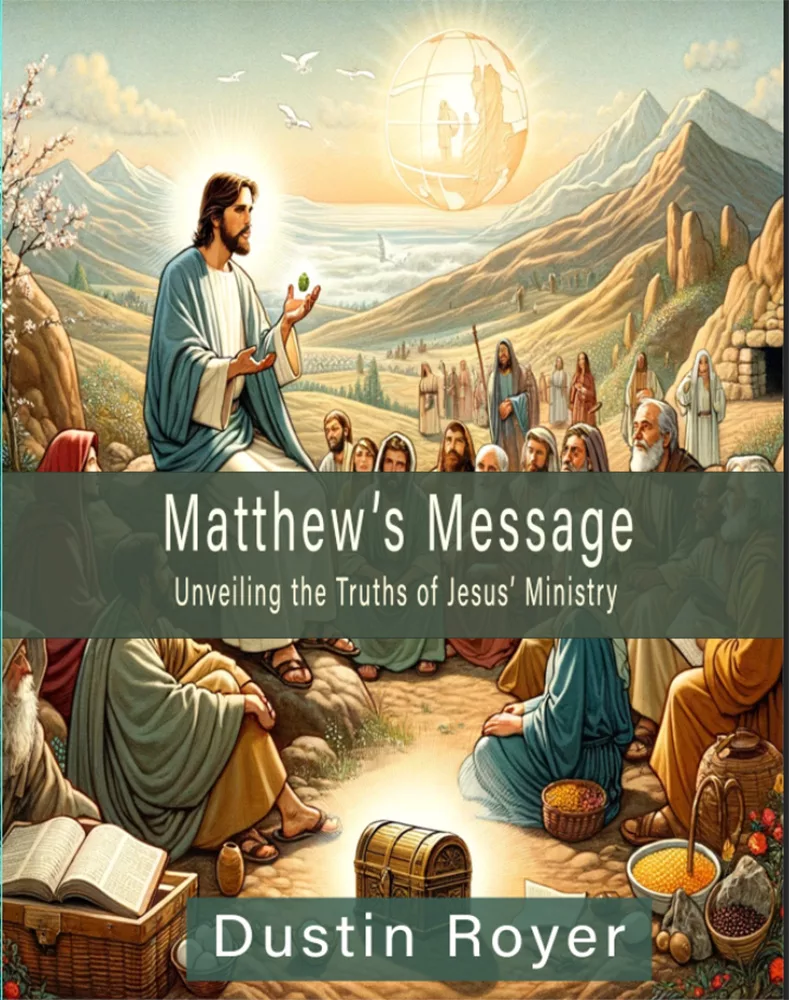
Note: for the best experience please pick-up this book to follow along.
Welcome back to our 14-day journey through “Matthew’s Message: Unveiling the Truths of Jesus’ Ministry.” Today, we begin exploring the Passion of Christ, focusing on the Triumphal Entry and the Last Supper as recorded in Matthew 21:1-11 and Matthew 26:17-30. These events set the stage for Jesus’ sacrificial death and the establishment of the New Covenant.
The Triumphal Entry:
Matthew 21:1-11 – As Jesus and His disciples approached Jerusalem, He sent two of them ahead to find a donkey and her colt. Jesus’ entry into Jerusalem riding on a donkey fulfilled the prophecy from Zechariah 9:9, symbolizing His humility and the arrival of the King of peace.
- Fulfillment of Prophecy:
- Matthew 21:4-5 – “This took place to fulfill what was spoken through the prophet: ‘Say to Daughter Zion, “See, your king comes to you, gentle and riding on a donkey, and on a colt, the foal of a donkey.”‘”
- Jesus’ entry into Jerusalem on a donkey was a deliberate act to fulfill Zechariah’s prophecy, signifying His identity as the Messiah and the nature of His kingdom—one of peace and humility.
- The Crowd’s Response:
- Matthew 21:8-9 – “A very large crowd spread their cloaks on the road, while others cut branches from the trees and spread them on the road. The crowds that went ahead of him and those that followed shouted, ‘Hosanna to the Son of David!’ ‘Blessed is he who comes in the name of the Lord!’ ‘Hosanna in the highest heaven!'”
- The crowd’s enthusiastic welcome and cries of “Hosanna” revealed their hopes and expectations for Jesus as the promised King. However, their understanding was limited, anticipating a political deliverer rather than a suffering Savior.
The Last Supper:
Matthew 26:17-30 – As the Passover approached, Jesus gathered His disciples for a final meal. This Last Supper was filled with profound significance, as Jesus established the New Covenant and instituted the practice of Communion.
- Preparation for the Passover:
- Matthew 26:17-19 – “On the first day of the Festival of Unleavened Bread, the disciples came to Jesus and asked, ‘Where do you want us to make preparations for you to eat the Passover?’ He replied, ‘Go into the city to a certain man and tell him, “The Teacher says: My appointed time is near. I am going to celebrate the Passover with my disciples at your house.”‘ So the disciples did as Jesus had directed them and prepared the Passover.”
- Jesus intentionally prepared for this moment, knowing it would be His final meal before His crucifixion. This preparation underscored the importance of the Passover in foreshadowing His sacrificial death.
- Jesus Predicts His Betrayal:
- Matthew 26:20-25 – During the meal, Jesus revealed that one of His disciples would betray Him. This announcement shocked and saddened the disciples, highlighting the impending betrayal by Judas Iscariot.
- Jesus’ foreknowledge of His betrayal and calm acceptance of it underscores His sovereignty and willingness to fulfill God’s redemptive plan.
- The Institution of the Lord’s Supper:
- Matthew 26:26-29 – “While they were eating, Jesus took bread, and when he had given thanks, he broke it and gave it to his disciples, saying, ‘Take and eat; this is my body.’ Then he took a cup, and when he had given thanks, he gave it to them, saying, ‘Drink from it, all of you. This is my blood of the covenant, which is poured out for many for the forgiveness of sins. I tell you, I will not drink from this fruit of the vine from now on until that day when I drink it new with you in my Father’s kingdom.'”
- Jesus reinterpreted the elements of the Passover meal, identifying the bread with His body and the wine with His blood. This act established the New Covenant, signifying the sacrificial giving of His life for the forgiveness of sins and instituting the practice of Communion as a remembrance of His sacrifice.
Reflection and Application:
The Triumphal Entry and the Last Supper reveal Jesus’ deliberate fulfillment of prophecy and His establishment of the New Covenant. Reflect on how these events demonstrate His sovereignty, humility, and sacrificial love. Consider the following questions:
- How does Jesus’ fulfillment of prophecy strengthen your faith in God’s redemptive plan?
- What significance does the Lord’s Supper hold for you in remembering Jesus’ sacrifice?
- In what ways can you cultivate a deeper appreciation for Jesus’ humility and willingness to suffer for our salvation?
Prayer:
Lord, thank You for fulfilling prophecy and willingly laying down Your life for our salvation. Help us to remember and honor Your sacrifice through the practice of Communion. Deepen our appreciation for Your humility and love, and strengthen our faith in Your sovereign plan. May we live in gratitude and obedience, reflecting Your grace to the world. Amen.
Tomorrow, we’ll continue exploring the Passion of Christ by focusing on the events leading up to and including the crucifixion. Join us as we reflect on the profound significance of Jesus’ sacrificial death and the redemption it brings.
Feel free to share your thoughts, reflections, and questions in the comments below. Let’s continue this journey together, seeking to grow in our faith and understanding of our Savior.
Stay blessed, Dustin Royer